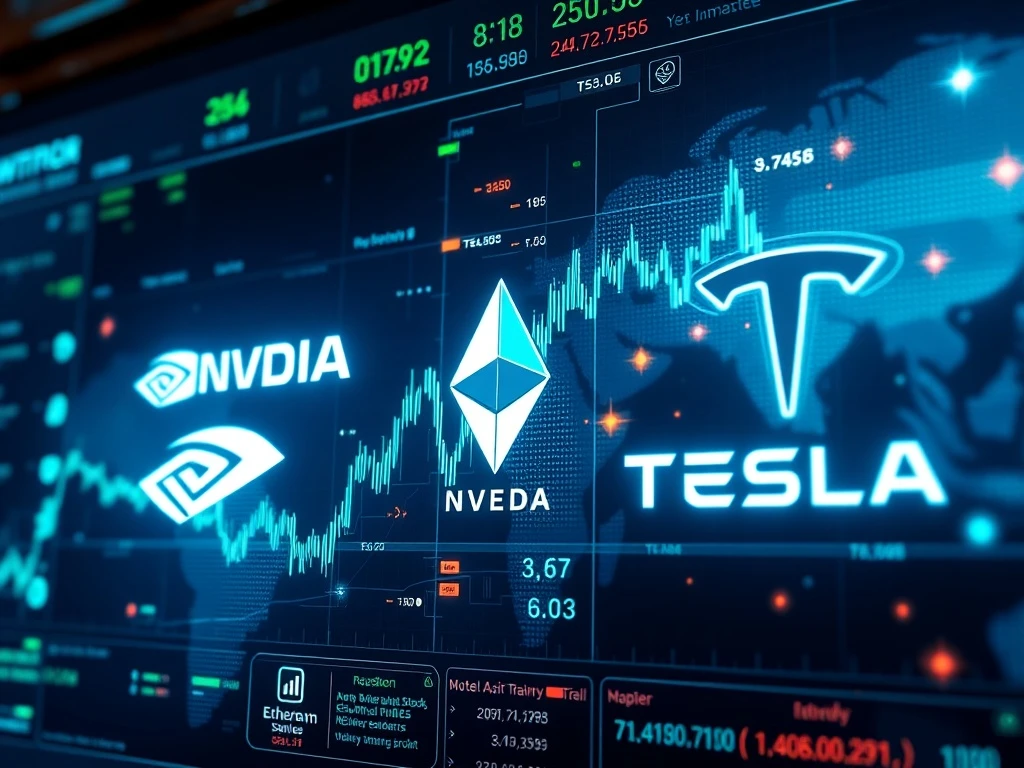XStocks Revolution: 60 Tokenized Stocks Now Live on Ethereum, Unlocking New Opportunities

For crypto enthusiasts seeking innovative investment avenues, a significant development has emerged. XStocks, a leading tokenized stock product, has officially launched on the Ethereum blockchain, bringing a diverse portfolio of 60 tokenized stocks to the forefront. This expansion promises to unlock new opportunities for investors, bridging traditional finance with the decentralized world. This move marks a crucial step in the evolution of real-world assets (RWA) on blockchain, further integrating established market giants like Nvidia and Tesla into the crypto ecosystem.
XStocks Ethereum Launch: Expanding Digital Horizons
XStocks, owned by Backed Finance, made its highly anticipated debut on Ethereum with approximately 60 tokenized stocks. These include shares from tech giants such as NVIDIA, Amazon, Tesla, Meta, and Walmart, according to a recent announcement. This launch significantly expands access to traditional equities within the decentralized finance (DeFi) landscape. Before this Ethereum rollout, XStocks had already established a presence on other prominent blockchains, including Solana, BNB Chain, and Tron, demonstrating its commitment to multi-chain accessibility.
Backed Finance, a specialized real-world assets (RWA) tokenization company, drives the platform. It actively partners with major crypto exchanges, like Kraken and Bybit, to facilitate the availability of its innovative products. A Kraken representative highlighted the strategic importance of this move, stating, “Ethereum is one of the world’s most widely adopted smart contract networks — and XStocks were built to meet users where they already are.” Indeed, Ethereum leads the DeFi sector, boasting a substantial total value locked (TVL) of $90.8 billion, representing 60% of the overall TVL across all blockchains as of recent data. Furthermore, other platforms like Gemini and eToro are also exploring or have launched tokenized stock trading within the Ethereum ecosystem, underscoring a growing trend.
Understanding Tokenized Stocks and Blockchain Technology
Tokenized stocks represent a digital share of a traditional company’s stock, recorded on a blockchain. This process, known as real-world asset (RWA) tokenization, involves creating a digital representation of a financial or physical asset on a blockchain network. For instance, a tokenized stock on Ethereum means that a digital token represents ownership or exposure to a traditional stock. This innovation aims to enhance liquidity and accessibility, particularly for assets that might otherwise be illiquid, such as real estate. The underlying principle leverages blockchain technology to provide transparency, immutability, and efficient transferability.
The market for tokenized alternative funds has shown remarkable growth, jumping 47% to $1.7 billion in just 30 days. This growth indicates increasing investor interest in digital representations of traditional assets. However, it’s crucial to understand the nuances of these digital instruments. While they offer many benefits, the legal framework surrounding tokenized stocks is still developing. This creates a complex environment for both innovators and regulators. The potential for democratizing investment is clear, yet the path forward requires careful navigation.
The Controversy: Navigating Crypto Regulations
Despite the technological advancements and the promise of democratized investing, tokenized stocks have not been without controversy. Global regulators and traditional stock exchanges have expressed significant reservations regarding this new application of blockchain technology. Proponents argue that tokenized equities remove unnecessary hurdles and regulatory silos, making investing more accessible. However, these digital assets often exist in a legal gray area, leading to uncertainty.
Legal experts frequently point out that holding tokenized stocks may not confer the same legal protections as directly owning the underlying stock. Specifically, investors might lack direct claims on company assets or voting rights typically associated with traditional share ownership. Consequently, stock exchanges and global regulators are pushing back, advocating for tighter oversight from bodies like the US Securities and Exchange Commission (SEC) and other watchdogs. This pressure highlights the ongoing challenge of integrating innovative crypto solutions into established financial systems while ensuring investor protection.
Market Growth and Future Outlook for Real-World Assets
Despite regulatory scrutiny, fintech and crypto firms continue to expand their tokenized equity offerings. A notable example is Robinhood, which launched a blockchain platform on June 30 to facilitate tokenized stock trading in Europe. This demonstrates a strong industry belief in the long-term potential of these digital assets. The current market capitalization for tokenized stocks stands at $342 million, according to analytics platform RWA.xyz. While this figure represents a mere 1.2% of the overall $27.9 billion tokenized RWA market cap, it indicates significant room for growth and adoption.
The continuous development and increasing interest in real-world assets tokenization suggest a transformative period for finance. As more traditional assets find their way onto blockchains, the lines between traditional and decentralized finance will continue to blur. However, the success of this integration will heavily depend on how effectively industry participants and regulators can collaborate to establish clear frameworks. The journey of XStocks on Ethereum is a testament to the ongoing innovation, but also a reminder of the critical need for balanced crypto regulations that foster innovation while safeguarding market integrity and investor interests. The future of finance could very well be built on these digital bridges between the old and new worlds.










